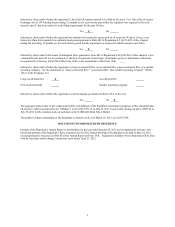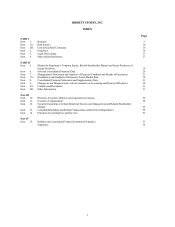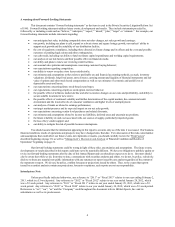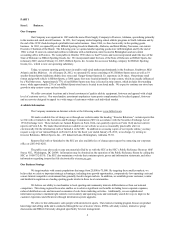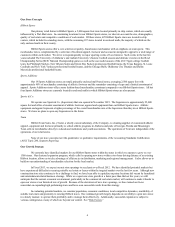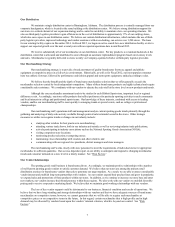Hibbett Sports 2012 Annual Report Download - page 16
Download and view the complete annual report
Please find page 16 of the 2012 Hibbett Sports annual report below. You can navigate through the pages in the report by either clicking on the pages listed below, or by using the keyword search tool below to find specific information within the annual report. 12
increases in the cost of purchasing or shipping foreign merchandise resulting from:
foreign government regulations;
rising commodity prices;
changes in currency exchange rates or policies and local economic conditions; and
trade restrictions, including import duties, import quotas or loss of “most favored nation” status with the
United States.
In addition, to the extent that any foreign manufacturer from whom our vendors are associated may directly or
indirectly utilize labor practices that are not commonly accepted in the United States, we could be affected by any resulting
negative publicity. Our net sales and operating income could decline if vendors are unable to promptly replace sources providing
equally appealing products at a similar cost.
Security threats, including physical and cyber security threats, and unauthorized disclosure of sensitive or confidential
information could harm our business and reputation with our consumers.
The protection of Company, customer and employee data is critical to us. We rely on third-party systems, software and
monitoring tools to provide security for processing, transmission and storage of confidential customer and employee information
such as payment card and personal information. Although our information systems are protected by internal and external security
measures, our systems may still be vulnerable to computer viruses, thefts, cyber attacks, acts of vandalism, programming and/or
human errors, disruptions caused by unauthorized tampering or outages caused by natural disasters or other similar events.
Cyber security threats are evolving and include, but are not limited to, malicious software, attempts to gain unauthorized
access to data and other electronic security breaches that could lead to disruptions in critical systems, unauthorized release of
confidential or otherwise protected information and corruption of data. Any security breach involving the misappropriation, loss or
other unauthorized disclosure of confidential information, whether by us or our providers, could damage our reputation, expose us to
risk of litigation and liability and harm our business.
Problems with our information system could disrupt our operations and negatively impact our financial results and materially
adversely affect our business operations.
The efficient operation of our business is dependent on the successful integration and operation of our information
systems. In particular, we rely on our information systems to effectively manage our sales, distribution, merchandise planning
and replenishment, to process financial information and sales transactions and to optimize our overall inventory levels. We
attempt to mitigate the risk of possible business interruptions by maintaining a disaster recovery plan, which includes storing
critical business information off-site. Most of our information systems are centrally located at our headquarters, with offsite
backup at other locations. Our systems, if not functioning properly, could disrupt our ability to track, record and analyze sales
and inventory movement and could cause disruptions of operations, including, among other things, our ability to process and ship
inventory, process financial information including credit card transactions, process payrolls or vendor payments or engage in
other similar normal business activities. Although we attempt to mitigate the risk of possible business interruptions, any material
disruption, malfunction or any other similar problem in or with our information systems could negatively impact our financial
results and materially adversely affect our business operations.
Pressure from our competitors may force us to reduce our prices or increase our spending, which would lower our net sales
and operating income.
The business in which we are engaged is highly competitive. The marketplace for sporting goods is highly fragmented as
many different retailers compete for market share by utilizing a variety of store formats and merchandising strategies. We compete
with local sporting goods stores, department and discount stores, traditional shoe stores and mass merchandisers and, on a limited
basis, national sporting goods stores. Many of our competitors have greater financial resources than we do. In addition, many of our
competitors employ price discounting policies that, if intensified, may make it difficult for us to reach our sales goals without
reducing our prices. As a result of this competition, we may also need to spend more on advertising and promotion than we
anticipate. We cannot guarantee that we will continue to be able to compete successfully against existing or future competitors.
Expansion into markets served by our competitors, entry of new competitors or expansion of existing competitors into our markets
could be detrimental to our business, financial condition and results of operations.
Our operating results are subject to seasonal and quarterly fluctuations. Furthermore, our quarterly operating results, including
comparable store net sales, will fluctuate and may not be a meaningful indicator of future performance.
We have historically experienced and expect to continue to experience seasonal fluctuations in our net sales, operating
income and net income. Our net sales, operating income and net income are typically higher in the spring, back-to-school and
holiday shopping seasons. An economic downturn during these periods could adversely affect us to a greater extent than if a
downturn occurred at other times of the year.


